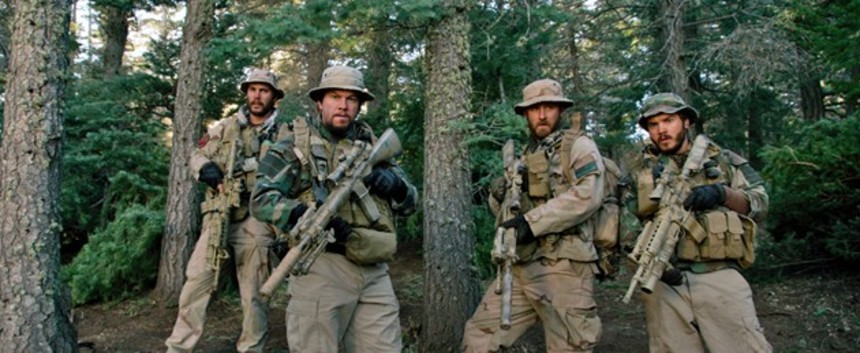Review: LONE SURVIVOR Offers An Intense, Visceral Depiction Of The War Experience

Samuel Fuller, who directed some of the best war movies ever made, and who was a combat veteran himself, famously stated, "To make a real war movie would be to fire at the audience from behind a screen." Peter Berg's latest film, Lone Survivor, of course, stops well short of this hypothetical method of bringing the brutal realities of war home to the audience. However, writer-director Berg seems to have taken the ethos behind Fuller's statement deeply to heart in his presentation of warfare.
Lone Survivor is based on the memoir of the same name by Marcus Luttrell, the sole survivor of the ill-fated Navy SEAL "Operation Red Wings" military mission in Afghanistan that claimed the lives of 19 U.S. soldiers in June 2005. More than any film in recent memory, Lone Survivor immerses us into the dirty, nasty business of warfare, and provides an almost unbearably intense, vicarious experience of the sights and sounds of the battlefield. The film vividly depicts an environment where potential death lurks behind every tree and mountain, and where all the planning, logistics and strategy get whittled away, boiled down to the basic survival instinct of kill or be killed.
Lone Survivor doesn't start out too promisingly. The beginning of the film has Marcus Luttrell (Mark Wahlberg) lying wounded in a plane, as he's being carried away from the battlefield in Afghanistan. Marcus' voice-over spouts familiar bromides about the brotherhood of war and remembering fallen comrades. This, after an opening credits montage showing basic training, looking like a recruitment ad, leads one to anticipate a simplistically pro-military rah-rah sort of movie. But to writer-director Peter Berg's great credit, this ultimately proves to be far from that kind of film.
We don't get whole lot of back story on the group of soldiers that the film follows. This core group includes Lt. Michael Murphy (Taylor Kitsch), Danny P. Dietz (Emile Hirsch), and Matthew "Axe" Axelson (Ben Foster). However, we're given just enough information, through the dialog and the actors' skillful way of showing the camaraderie of these men, to convey the idea of them as unique individuals with full lives and aspirations for the future. But as each life gets snuffed out, one by one, we are invited to grieve for each life that gets cut short, and for the loved ones they'll leave behind. (This feeling is forcefully brought home by the end credits, scored to Peter Gabriel's cover of David Bowie's "Heroes," which show pictures and video of the real-life soldiers.)
The heart of the film is a central 40 minutes-or-so sequence that depicts the mission, which targets a Taliban commander and his fighters. When their mission is compromised by a group of goat-herders who discover their position, the soldiers are faced with the dilemma of whether to let them go, after which the goat-herders will most likely inform the Taliban, or to kill them and face punishment for violating the rules of engagement by killing unarmed civilians. After some debate, Lt. Murphy makes the executive decision to let the men go, and sure enough, the Taliban is soon able to find them.
The soldiers now must engage in a vicious firefight with the Taliban fighters, hopelessly outnumbered with a handful of U.S. soldiers facing over a hundred Taliban, unable to radio for backup. The sequence that follows is almost unbearably intense, as the soldiers dodge rifle and grenade fire from the Taliban, and tumble down the unforgivingly rough terrain of the mountains. Each fall and hard landing, every bullet and piece of shrapnel tearing though flesh registers with powerful force, immersing us into the scene with vivid immediacy.
The most valuable aspect of Lone Survivor is that it tells its story with a refreshing lack of jingoism, digging deeply in the humanity and heroism that exist on both sides of the American/Afghan divide. To Berg's great credit, the Afghans are not portrayed as simply faceless villains. The Taliban are appropriately presented as murderous, ruthless people, but there are also other Afghans who resist the Taliban's tyranny; they aid the Americans at the risk of their own lives. Luttrell gets crucial assistance from a number of them following the battle, when he finds himself behind enemy lines; the denouement of this story thread is incredibly moving.
Lone Survivor is a technically impressive and emotionally moving film that contains a fine central turn by Wahlberg, and viscerally brings home the human costs of war, eliciting deep respect for those who willingly risk their lives, and lose their lives, to pursue ideals of service and sacrifice for others.

Do you feel this content is inappropriate or infringes upon your rights? Click here to report it, or see our DMCA policy.






